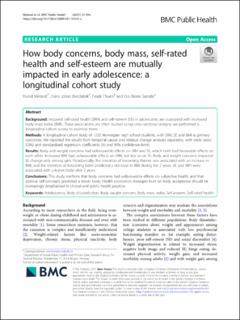How body concerns, body mass, self-rated health and self-esteem are mutually impacted in early adolescence: a longitudinal cohort study
Journal article, Peer reviewed
Published version

Åpne
Permanent lenke
https://hdl.handle.net/11250/2767669Utgivelsesdato
2021Metadata
Vis full innførselSamlinger
Sammendrag
Background
Impaired self-rated health (SRH) and self-esteem (SE) in adolescents are associated with increased body mass index (BMI). These associations are often studied using cross-sectional designs; we performed a longitudinal cohort survey to examine them.
Methods
A longitudinal cohort study of 1225 Norwegian high school students, with SRH, SE and BMI as primary outcomes. We reported the results from temporal causal and residual change analyses separately, with odds ratios (ORs) and standardised regression coefficients (b) and 95% confidence limits.
Results
Body and weight concerns had unfavourable effects on SRH and SE, which both had favourable effects on each other. Increased BMI had unfavourable effects on SRH, but less so on SE. Body and weight concerns impacted SE change only among girls. Paradoxically, the intention of becoming thinner was associated with an increase in BMI, and the intention of becoming fatter predicted a decrease in BMI during the 2 years. SE and SRH were associated with a leaner body after 2 years.
Conclusions
This study confirms that body concerns had unfavourable effects on subjective health, and that positive self-concepts predicted a leaner body. Health promotion strategies built on body acceptance should be increasingly emphasised in clinical and public health practice.
